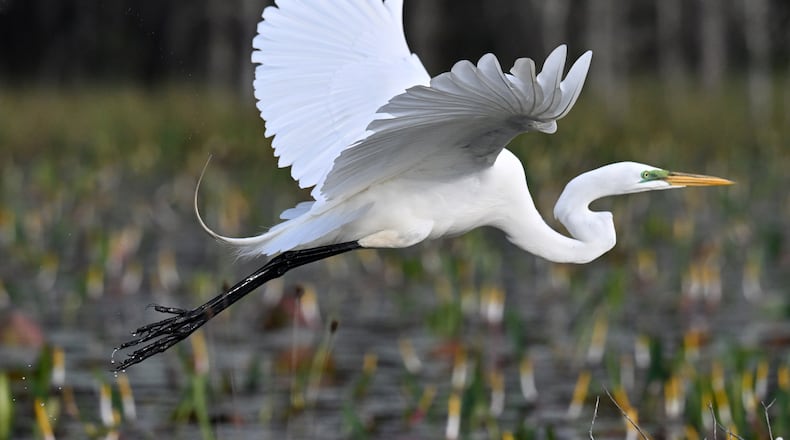Want to chime in on an Alabama company’s plan to mine near the Okefenokee Swamp? Today is your last chance.
For the last five years, Twin Pines Minerals has sought permits to develop a 582-acre mine on the mineral-rich sand dunes along the swamp’s eastern edge.
Twin Pines’ controversial plan to mine on the doorstep of North America’s largest blackwater swamp took a major step forward in early February, when the Georgia Environmental Protection Division (EPD) released draft permits for the project. That kicked off a 60-day window for the public to review and comment on the permits.
That period ends today 4:30p ET. Anyone who would like to weigh in can send written remarks to TwinPines.Comment@dnr.ga.gov.
Here’s what you need to know about the permits and what could happen next.
What do the permits allow?
Twin Pines plans to use a bucket controlled by a crane-mounted pulley system to extract titanium sands, a method known as “dragline mining.” Its 500-foot wide by 100-foot long mining pit will move 100 to 200 feet a day across the site, with the company backfilling with sediment into the 50-foot trench it digs as it goes.
The three draft permits that have been released are for groundwater withdrawals, air quality and surface mining.
Credit: HYOSUB SHIN / AJC
Credit: HYOSUB SHIN / AJC
The most significant are the groundwater and mining permits.
The groundwater permit would allow Twin Pines to pump just about 1.5 million gallons of water a day from the Floridan aquifer, the vast underground reservoir that lies beneath south Georgia, Florida and other states. That water will be used by the company as it separates the titanium-rich minerals it wants from scrap sand.
As the mine pit moves across the site, the project will also impact a shallower aquifer just below the surface. But the draft permit does not cover those withdrawals, and EPD has not indicated that a separate groundwater license is needed.
The draft surface mining permit requires the company to follow state erosion and sediment control rules, inspect and maintain its water storage ponds, plus reclaim the land that is disturbed. Twin Pines will have to file periodic reports with EPD on its restoration efforts and groundwater quality.
The project, notably, does not have a wastewater permit, which is unusual for a water-intensive mine. Instead, the company plans to use huge evaporators to send its wastewater into the air as steam.
What concerns have been raised?
As of Monday morning, EPD spokeswoman Sara Lips said the agency had received more than 74,000 comments on the draft permits.
A break down of how many comments are in favor or opposed to the mine was not released. But if history is any indication, most are likely in opposition: During a three-hour virtual public meeting held by EPD last month on the draft permits, not a single attendee spoke in favor of the project.
Twin Pines’ and its environmental consultants have repeatedly said the mine won’t harm the Okefenokee. EPD has mostly concurred with their assessment.
But several influential scientists and environmental groups have already submitted comments critical of the mine and the permits, according to documents shared with The Atlanta Journal-Constitution.
Rhett Jackson, a hydrologist at UGA, has submitted new comments to EPD warning that Twin Pines’ groundwater withdrawals will increase the frequency of drought in the swamp and lower flows on the St. Marys River.
Credit: HYOSUB SHIN / AJC
Credit: HYOSUB SHIN / AJC
Kristen Ritter Rivera, a former EPD employee who previously served on the State Board of Professional Geologists as a Kemp appointee, submitted comments questioning the models and data that were used to evaluate the mine’s impact.
Earlier this year, Twin Pines was fined $20,000 by EPD for drilling soil samples without the oversight of a professional geologist, or posting the necessary bond to do the work. The company has denied any wrongdoing.
Rivera said the violations raise questions about the integrity of the data the company collected and called for an independent panel to review their modeling.
The nonprofit Georgia Conservancy also voiced concerns about the mine in its comments, arguing that EPD should reject the surface mining permit. At a minimum, the group said groundwater and surface water monitoring should be required to continue for at least three years after Twin Pines’ mining concludes, and before any new permits can be considered.
What happens next?
EPD will review all comments it receives, a process that could take days or many weeks to months.
The agency has said it will then respond to technical feedback publicly on its website. From there, EPD could deny the permits, require Twin Pines to make changes to its plans, or grant the permits.
While EPD sifts through comments, efforts are underway to ratchet up pressure on Gov. Brian Kemp, who has mostly stayed mum on the mine.
Last week, a letter signed by more than 70 faith leaders representing different religious traditions asked Gov. Kemp to reject the permit applications.
“As people of faith, our values call us to care for the Earth,” the letter reads, which was spearheaded by Georgia Interfaith Power and Light. “The proposed desecration of the Okefenokee Swamp cannot be permitted.”
Kemp has referred previous requests for comment to EPD.
Editor’s note: This story has been updated to correct the period of time in the public comment window, which was 60 days.
A note of disclosure
This coverage is supported by a partnership with Green South Foundation and Journalism Funding Partners. You can learn more and support our climate reporting by donating at ajc.com/donate/climate/
About the Author
Keep Reading
The Latest
Featured





